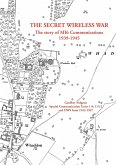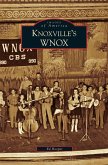Simon J Potter, David Clayton, Friederike Kind-Kovacs, Vincent Kuitenbrouwer, Nelson Ribeiro, Rebecca Scales, Andrea Stanton
The Wireless World
Global Histories of International Radio Broadcasting
Simon J Potter, David Clayton, Friederike Kind-Kovacs, Vincent Kuitenbrouwer, Nelson Ribeiro, Rebecca Scales, Andrea Stanton
The Wireless World
Global Histories of International Radio Broadcasting
- Gebundenes Buch
- Merkliste
- Auf die Merkliste
- Bewerten Bewerten
- Teilen
- Produkt teilen
- Produkterinnerung
- Produkterinnerung
The Wireless World sheds new light on the transnational connections created by international broadcasting, using a single analytical frame to draw together the periods from the pioneering days of wireless, through WWII and the Cold War, to the decades since the fall of the Berlin Wall to reveal key continuities and transformations.
Andere Kunden interessierten sich auch für
![A History of Wireless Telegraphy A History of Wireless Telegraphy]() John Joseph FahieA History of Wireless Telegraphy38,99 €
John Joseph FahieA History of Wireless Telegraphy38,99 €![A History of Wireless Telegraphy A History of Wireless Telegraphy]() John Joseph FahieA History of Wireless Telegraphy37,99 €
John Joseph FahieA History of Wireless Telegraphy37,99 €![The Secret Wireless War The Secret Wireless War]() Geoffrey PidgeonThe Secret Wireless War24,99 €
Geoffrey PidgeonThe Secret Wireless War24,99 €![Radio in Revolution Radio in Revolution]() Joseph Justin CastroRadio in Revolution69,99 €
Joseph Justin CastroRadio in Revolution69,99 €![Cold War Radio Cold War Radio]() Mark G PomarCold War Radio28,99 €
Mark G PomarCold War Radio28,99 €![Knoxville's WNOX Knoxville's WNOX]() Ed HooperKnoxville's WNOX22,99 €
Ed HooperKnoxville's WNOX22,99 €![Regulations for United States Military Telegraph Lines, Alaskan Cables & Wireless Telegraph Stations Regulations for United States Military Telegraph Lines, Alaskan Cables & Wireless Telegraph Stations]() Regulations for United States Military Telegraph Lines, Alaskan Cables & Wireless Telegraph Stations31,99 €
Regulations for United States Military Telegraph Lines, Alaskan Cables & Wireless Telegraph Stations31,99 €-
-
-
The Wireless World sheds new light on the transnational connections created by international broadcasting, using a single analytical frame to draw together the periods from the pioneering days of wireless, through WWII and the Cold War, to the decades since the fall of the Berlin Wall to reveal key continuities and transformations.
Hinweis: Dieser Artikel kann nur an eine deutsche Lieferadresse ausgeliefert werden.
Hinweis: Dieser Artikel kann nur an eine deutsche Lieferadresse ausgeliefert werden.
Produktdetails
- Produktdetails
- Verlag: Hurst & Co.
- Seitenzahl: 308
- Erscheinungstermin: 15. Dezember 2022
- Englisch
- Abmessung: 229mm x 163mm x 38mm
- Gewicht: 635g
- ISBN-13: 9780192864987
- ISBN-10: 019286498X
- Artikelnr.: 66148668
- Herstellerkennzeichnung
- Libri GmbH
- Europaallee 1
- 36244 Bad Hersfeld
- gpsr@libri.de
- Verlag: Hurst & Co.
- Seitenzahl: 308
- Erscheinungstermin: 15. Dezember 2022
- Englisch
- Abmessung: 229mm x 163mm x 38mm
- Gewicht: 635g
- ISBN-13: 9780192864987
- ISBN-10: 019286498X
- Artikelnr.: 66148668
- Herstellerkennzeichnung
- Libri GmbH
- Europaallee 1
- 36244 Bad Hersfeld
- gpsr@libri.de
Simon J. Potter is Professor of Modern History at the University of Bristol. He has published widely on media history and imperial history, with books including News and the British World: The Emergence of an Imperial Press System, 1876-1922 (OUP, 2003); Broadcasting Empire: The BBC and the British world, 1922-1970 (OUP, 2012); and Wireless Internationalism and Distant Listening: Britain, Propaganda, and the Invention of Global Radio, 1920-39 (2020). He has also published a centenary history of the BBC, This the BBC: Entertaining the Nation, Speaking for Britain, 1922-2022 (OUP, 2022). David Clayton is Senior Lecturer in Modern History at the University of York. He has written on the economic history of the British Empire in the twentieth century, with a particular focus on Hong Kong. His work on radio broadcasting has been published in the Economic History Review and the European Review of Economic History, and he is currently writing on British colonial broadcasting from 1930 to 1960, focusing on the building of infrastructures and the uptake of radio receiving sets. Friederike Kind-Kovács is Senior Researcher at the Hannah Arendt Institute for Totalitarianism Research at TU Dresden and Lecturer at Regensburg University. She is the author of Budapest's Children: Humanitarian Relief in the Aftermath of the Great War (2022) and Written Here, Published There: How Underground Literature Crossed the Iron Curtain (2014), which won the University of Southern California Book Prize in Cultural and Literary Studies for 2015. She has co-edited two volumes: From the Midwife's Bag to the Patient's File: Public Health in Eastern Europe (2017) and Samizdat, Tamizdat and Beyond: Transnational Media during and after Socialism (2013), and most recently a double special issue on Childhood in Times of Political Transformation (2021). Vincent Kuitenbrouwer is senior lecturer in the History of International Relations at the University of Amsterdam. He specialises in nineteenth- and twentieth-century imperial history and has a special interest in colonial media networks. He is currently working on Dutch international radio broadcasting in the late colonial period and the era of decolonisation. Recent publications include 'Radio as a Tool of Empire. Intercontinental Broadcasting from the Netherlands to the Dutch East Indies in the 1920s and 1930s', Itinerario (2016) and '"From Heart to Heart": Colonial Radio and the Dutch Imagined Community in the 1920s' in G. Blok et al. (eds), Imagining Communities: Historical Reflections on the Process of Community Formation (2018). Nelson Ribeiro is Associate Professor of Communication Studies at the Universidade Católica Portuguesa, Lisbon. His research focuses on media history, and particularly on international broadcasting from the interwar period until the end of the Cold War. He is currently Principal Investigator in the project 'Broadcasting to the Portuguese Empire: Nationalism, Colonialism, Identity', and Chair of the History Section of the International Association for Media and Communication Research. His most recent co-edited books are Media and the Dissemination of Fear: Pandemics, Wars and Political Intimidation (2022) and Digital Roots: Historicizing Media and Communication Concepts of the Digital Age (2021). Rebecca P. Scales is Associate Professor of History at the Rochester Institute of Technology. She is the author of Radio and the Politics of Sound in Interwar France (2016), which examines how the airwaves became a new space for political engagement during the decades between the two world wars, transforming the act of listening into an important, if highly contested practice of citizenship. Her research on the cultural politics of broadcasting has appeared in French Historical Studies, Comparative Studies in Society and History, Media History, and French Politics, Culture, and Society. With Alejandra Bronfman and Andrea Stanton, she is a co-director of a National Endowment for the Humanities Summer Seminar for College and University Faculty entitled 'Radio and Decolonization: Bringing Sound into Twentieth-Century History'. Andrea L. Stanton is Associate Professor of Islamic Studies and Interim Director of the Korbel Center for Middle East Studies at the University of Denver. Her research focuses on interwar and mid-century Arabic-language radio broadcasting. She has published widely on the Palestine Broadcasting Service, as well as on the BBC's Arabic Service and on the Egyptian State Broadcasting Service. She has received grants from the American Academy of Religion, the Department of Education, the National Endowment for the Humanities, and the US Institute of Peace.
* 1: Out of the Ether: The Wireless World and New Histories of
International Radio Broadcasting
* 2: Technologies of International Radio Broadcasting
* 2.1: Radio Amateurs and 'DX-ing' Between the World Wars
* 2.2: 'Towers of Prestige': Dutch Transmitters and Public Relations
* 3: Institutions, States, and International Broadcasting
* 3.1: British Colonial Broadcasting in the 1940s
* .2: Media (and) Revolution: Western Broadcasting in Central and
Eastern Europe after 1989
* 4: Radio Wars: Histories of Cross-Border Radio Propaganda
* 4.1: Interwar Radio Propaganda for Arabic-speaking Listeners
* 4.2: News, Propaganda, and British and American International
Broadcasting during the Second World War
* 5: Broadcasting as Internationalism
* 5.1: International Broadcasting for a Pluri-Continental Nation?
Portuguese Colonial Broadcasting
* 5.2: The Song of the Trojan Horse: Radio Luxembourg and Allied
Propaganda at the End of the Second World War
* 6: Programmes, Soft Power, and Public Diplomacy
* 6.1: Dramatic and Literary Programming on the BBC Arabic Service
* 6.2: 'Is Everybody Happy?': Eddy Startz's Happy Station
* 7: Tuning-in to the World: International Broadcasting and its
Audiences
* 7.1: Listening to the BBC in Neutral Portugal during the Second World
War
* 7.2: Who (Else) is Listening? RIAS in the Early Cold War
* 8: The Soundscapes of the Wireless World
* 8.1: Costes and Bellonte's Transatlantic Flight: Tuning-in to a
Global Radio Event
* 8.2: Jammed Soundscapes in Eastern Europe, c. 1948-1959
* 9: Afterword: The Wireless World in the Age of Wi-Fi
International Radio Broadcasting
* 2: Technologies of International Radio Broadcasting
* 2.1: Radio Amateurs and 'DX-ing' Between the World Wars
* 2.2: 'Towers of Prestige': Dutch Transmitters and Public Relations
* 3: Institutions, States, and International Broadcasting
* 3.1: British Colonial Broadcasting in the 1940s
* .2: Media (and) Revolution: Western Broadcasting in Central and
Eastern Europe after 1989
* 4: Radio Wars: Histories of Cross-Border Radio Propaganda
* 4.1: Interwar Radio Propaganda for Arabic-speaking Listeners
* 4.2: News, Propaganda, and British and American International
Broadcasting during the Second World War
* 5: Broadcasting as Internationalism
* 5.1: International Broadcasting for a Pluri-Continental Nation?
Portuguese Colonial Broadcasting
* 5.2: The Song of the Trojan Horse: Radio Luxembourg and Allied
Propaganda at the End of the Second World War
* 6: Programmes, Soft Power, and Public Diplomacy
* 6.1: Dramatic and Literary Programming on the BBC Arabic Service
* 6.2: 'Is Everybody Happy?': Eddy Startz's Happy Station
* 7: Tuning-in to the World: International Broadcasting and its
Audiences
* 7.1: Listening to the BBC in Neutral Portugal during the Second World
War
* 7.2: Who (Else) is Listening? RIAS in the Early Cold War
* 8: The Soundscapes of the Wireless World
* 8.1: Costes and Bellonte's Transatlantic Flight: Tuning-in to a
Global Radio Event
* 8.2: Jammed Soundscapes in Eastern Europe, c. 1948-1959
* 9: Afterword: The Wireless World in the Age of Wi-Fi
* 1: Out of the Ether: The Wireless World and New Histories of
International Radio Broadcasting
* 2: Technologies of International Radio Broadcasting
* 2.1: Radio Amateurs and 'DX-ing' Between the World Wars
* 2.2: 'Towers of Prestige': Dutch Transmitters and Public Relations
* 3: Institutions, States, and International Broadcasting
* 3.1: British Colonial Broadcasting in the 1940s
* .2: Media (and) Revolution: Western Broadcasting in Central and
Eastern Europe after 1989
* 4: Radio Wars: Histories of Cross-Border Radio Propaganda
* 4.1: Interwar Radio Propaganda for Arabic-speaking Listeners
* 4.2: News, Propaganda, and British and American International
Broadcasting during the Second World War
* 5: Broadcasting as Internationalism
* 5.1: International Broadcasting for a Pluri-Continental Nation?
Portuguese Colonial Broadcasting
* 5.2: The Song of the Trojan Horse: Radio Luxembourg and Allied
Propaganda at the End of the Second World War
* 6: Programmes, Soft Power, and Public Diplomacy
* 6.1: Dramatic and Literary Programming on the BBC Arabic Service
* 6.2: 'Is Everybody Happy?': Eddy Startz's Happy Station
* 7: Tuning-in to the World: International Broadcasting and its
Audiences
* 7.1: Listening to the BBC in Neutral Portugal during the Second World
War
* 7.2: Who (Else) is Listening? RIAS in the Early Cold War
* 8: The Soundscapes of the Wireless World
* 8.1: Costes and Bellonte's Transatlantic Flight: Tuning-in to a
Global Radio Event
* 8.2: Jammed Soundscapes in Eastern Europe, c. 1948-1959
* 9: Afterword: The Wireless World in the Age of Wi-Fi
International Radio Broadcasting
* 2: Technologies of International Radio Broadcasting
* 2.1: Radio Amateurs and 'DX-ing' Between the World Wars
* 2.2: 'Towers of Prestige': Dutch Transmitters and Public Relations
* 3: Institutions, States, and International Broadcasting
* 3.1: British Colonial Broadcasting in the 1940s
* .2: Media (and) Revolution: Western Broadcasting in Central and
Eastern Europe after 1989
* 4: Radio Wars: Histories of Cross-Border Radio Propaganda
* 4.1: Interwar Radio Propaganda for Arabic-speaking Listeners
* 4.2: News, Propaganda, and British and American International
Broadcasting during the Second World War
* 5: Broadcasting as Internationalism
* 5.1: International Broadcasting for a Pluri-Continental Nation?
Portuguese Colonial Broadcasting
* 5.2: The Song of the Trojan Horse: Radio Luxembourg and Allied
Propaganda at the End of the Second World War
* 6: Programmes, Soft Power, and Public Diplomacy
* 6.1: Dramatic and Literary Programming on the BBC Arabic Service
* 6.2: 'Is Everybody Happy?': Eddy Startz's Happy Station
* 7: Tuning-in to the World: International Broadcasting and its
Audiences
* 7.1: Listening to the BBC in Neutral Portugal during the Second World
War
* 7.2: Who (Else) is Listening? RIAS in the Early Cold War
* 8: The Soundscapes of the Wireless World
* 8.1: Costes and Bellonte's Transatlantic Flight: Tuning-in to a
Global Radio Event
* 8.2: Jammed Soundscapes in Eastern Europe, c. 1948-1959
* 9: Afterword: The Wireless World in the Age of Wi-Fi








